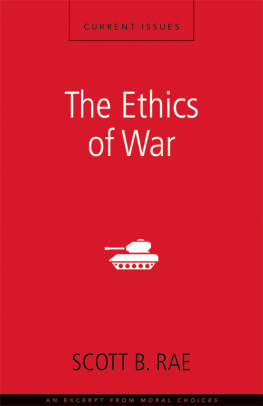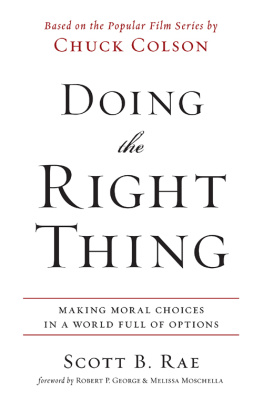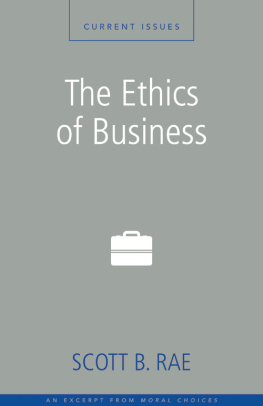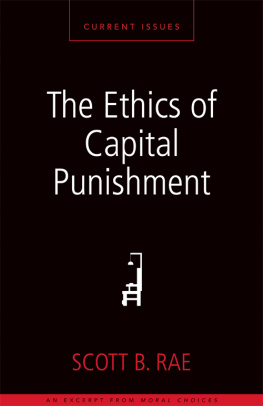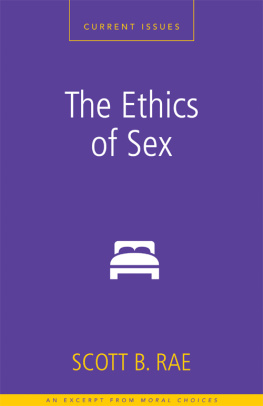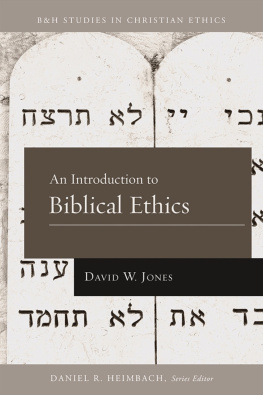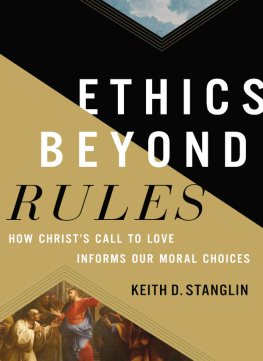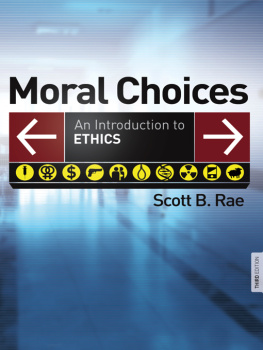ZONDERVAN
The Ethics of War
Previously published in Moral Choices
Copyright 1995, 2000, 2009 by Scott B. Rae
All rights reserved under International and Pan-American Copyright Conventions. By payment of the required fees, you have been granted the non-exclusive, non-transferable right to access and read the text of this e-book on-screen. No part of this text may be reproduced, transmitted, downloaded, decompiled, reverse engineered, or stored in or introduced into any information storage and retrieval system, in any form or by any means, whether electronic or mechanical, now known or hereinafter invented, without the express written permission of Zondervan.
EPub Edition JANUARY 2012 ISBN: 978-0-310-49649-6
Requests for information should be addressed to:
Zondervan, Grand Rapids, Michigan 49530
The Library of Congress has cataloged the original edition as follows:
Rae, Scott B.
Moral choices: an introduction to ethics / Scott B. Rae3rd ed.
p. cm.
ISBN 978-0-310-29109-1 (hardcover)
1. Ethics. I. Title.
BJ1012.R32 2009
170dc22 2009005151
All Scripture quotations, unless otherwise indicated, are taken from the Holy Bible, New International Version. NIV. Copyright 1973, 1978, 1984 by International Bible Society. Used by permission of Zondervan. All rights reserved.
All Scripture quotations marked TNIV are taken from the Holy Bible, Todays New International Version. Copyright 2001 by International Bible permission of Zondervan. All rights reserved.
Scripture quotations marked KJV are taken from the King James Version of the Bible.
Scripture quotations marked NASB are taken from the New American Standard Bible. Copyright 1960, 1962, 1963, 1968, 1971, 1972, 1973, 1975, 1977, 1995 by The Lockman Foundation. Used by permission.
Any Internet addresses (websites, blogs, etc.) and telephone numbers in this book are offered as a resource. They are not intended in any way to be or imply an endorsement by Zondervan, nor does Zondervan vouch for the content of these sites and numbers for the life of this book.
All rights reserved. No part of this publication may be reproduced, stored in a retrieval system, or transmitted in any form or by any meanselectronic, mechanical, photocopy, recording, or any otherexcept for brief quotations in printed reviews, without the prior permission of the publisher.
Cover design: Ron Huizinga
Interior design: Matthew Van Zomeran
In 2003 the United States launched an invasion of Iraq, with the initial intention of ousting Saddam Hussein and generating a stable democracy in the Arab Middle East. Many people saw it as a part of the response to the 9/11 terrorist attacks on the World Trade Center, a response that also included the war in Afghanistan, which was aimed at destroying terrorist bases of operations there. In the days leading up to the commencement of the invasion, there was a good deal of debate, both in Congress and in the media, over whether this was a war that should be undertaken. To be sure, there was a strategic component to the debatethat is, whether it was feasible to take on an invasion such as this. But a substantial degree of the discussion was about the morality of such a warwhether the Iraq war was a morally justified operation.
Interestingly, much of the debate centered on an idea that was at least a thousand years oldthe idea of just war. Although this concept was clarified and codified in the Middle Ages, its criteria for determining the justice of a war were still being appealed to in the debate over the Iraq war. Even people who disagreed with the final decision to go to war frequently appealed to the just war criteria to articulate their opposition to the war. Of course, some participants in the debate rejected the just war idea altogether and argued that going to war is never justifiable. These groups, known as pacifists, insist that the idea of a just war is an oxymoronthey argue that all wars are unjust and that all participation in war is immoral. The Iraq war contributed to somewhat of a resurgence of pacifism. Pacifists today sometimes prefer the term peacemakers to describe their position and consider the term pacifism to be a bit out of date.
The wars in recent history, especially since World War II, are grim reminders that humankind possesses greater skill and machinery to bring death and destruction in war than at any other time in human history. Even though the Cold War is over and there is not the same fear of nuclear weapons that there was at its peak, there is a sufficient nuclear arsenal to destroy the earth many times over. In addition, the remarkable rise of international terrorism in recent decades means that the traditional ways of conducting warfare have changed dramatically. Some suggest that concepts like the just war are actually obsolete because of these developments.
Imagine that you are sitting in on a panel discussion of the morality of the Iraq war. Others on this panel include an officer currently serving in the military, a Catholic priest, and a Protestant minister. All three have different views of the morality of war in general and the morality of the Iraq war in particular. Here is what the panelists might say to summarize their positions.
Officer on Active Duty
My position is that the world is a very dangerous place today, and many of the heads of state in certain parts of the world are aggressive, ruthless tyrants that support and facilitate international terrorism. War is necessary to defend ourselves from them. I further hold that in certain cases preventive strikes against enemies that are poised for imminent attack are also justifiable. I hold that both the wars in Iraq and Afghanistan are morally justifiable in the ongoing defense of our country against terrorism.
Catholic Priest
I believe that my military colleague has gone too far in defending which wars can be justified. My view is that the only wars that are justifiable are wars of self-defense. I hold to what is called the just war theory, which states that once aggression is visited upon a nation, the properly constituted authorities in that nation are morally justified in meeting force with force and defending their people from a hostile aggressor. I cannot support any aggressive use of military force. It cannot be used unless and until another country has initiated a conflict. The only wars that are morally allowable are those fought in self-defense, such as the Wests efforts in defeating the Nazis in World War II. Since Iraq did not initiate aggressive military action against the United States directly, and it is debatable whether Iraq was involved with the 9/11 attacks, I have major reservations about calling the Iraq war a just war.
Protestant Minister
I think you both are wrong and out of step with clear biblical teaching on this subject. Both Jesus and the early church were pacifists. Jesus taught his followers to turn the other cheek, to leave vengeance to God and not to use violence in any way to accomplish any purpose. The Beatitudes tell us, Blessed are the peacemakers, and I take that to mean that any involvement in war, either as a combatant or noncombatant, is inconsistent with that. In addition, the people who were closest to Jesus chronologically were also pacifists. The early church for about the first three centuries had nothing to do with the military. Only when Christianity became the official religion of the Roman Empire and had national interests that needed defending did the use of violence get church sanction. Thus, not only do I believe that the Iraq war was totally unjustified, but I hold that all use of violence is wrong.
What do you think of the panelists statements? Which position do you find most persuasive to you and most consistent with your moral views? As you read this essay and these views are more fully explained, come back to this panel discussion and think about what you would say if you were one of the panel members.

